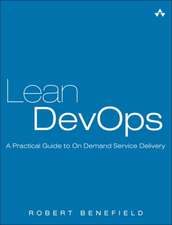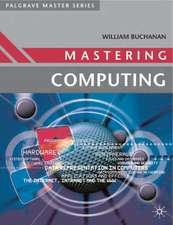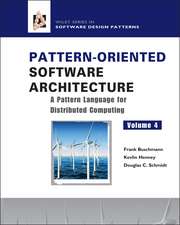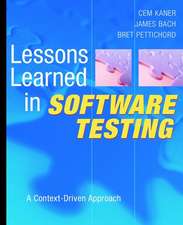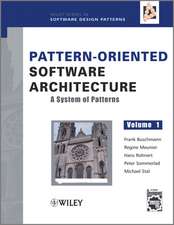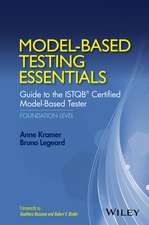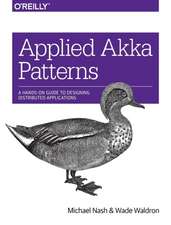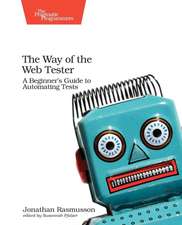Empirical Foundations of Information and Software Science V
Editat de Pranas Zunde, D. Hockingen Limba Engleză Paperback – 13 mar 2012
Preț: 345.91 lei
Preț vechi: 432.39 lei
-20% Nou
Puncte Express: 519
Preț estimativ în valută:
66.19€ • 69.29$ • 54.77£
66.19€ • 69.29$ • 54.77£
Carte tipărită la comandă
Livrare economică 05-19 aprilie
Preluare comenzi: 021 569.72.76
Specificații
ISBN-13: 9781468458640
ISBN-10: 1468458647
Pagini: 500
Ilustrații: 490 p.
Dimensiuni: 170 x 244 x 26 mm
Greutate: 0.79 kg
Ediția:Softcover reprint of the original 1st ed. 1990
Editura: Springer Us
Colecția Springer
Locul publicării:New York, NY, United States
ISBN-10: 1468458647
Pagini: 500
Ilustrații: 490 p.
Dimensiuni: 170 x 244 x 26 mm
Greutate: 0.79 kg
Ediția:Softcover reprint of the original 1st ed. 1990
Editura: Springer Us
Colecția Springer
Locul publicării:New York, NY, United States
Public țintă
ResearchCuprins
I. Keynote Address.- Software for Human Hardware?.- II. Invited Papers.- Software Process Modeling: The TRIAD Approach.- Modeling the Software Design Process.- Methodological Principles of Uncertainty in Information Systems Modeling.- CAST — Modelling Approaches in Software Design.- Organizational Integration: Modeling Technology and Management.- Parallel Models in Software Life Cycle.- III. Modeling Methodologies.- A Methodology for Eliciting Users Cognitive Models of Computer-Based Systems.- Use of a Blackboard Framework to Model Software Design.- The Entity-Relationship Data Model Considered Harmful.- Automatic Generation of Conceptual Database Design Tools.- IV. Modeling Information Systems.- Modeling and Evaluation of Information Systems.- Static vs. Dynamic Information Systems Modeling: A Cooperation Based Approach. ..- Architectural Modeling of Complex Information Systems.- A Management Model for Effective Information-Use in Research Work.- Software Implementation and Applications of the Generalized Information System.- V. Modeling Human-Machine Interaction.- Building a User Modelling Shell.- Evaluation of Human-Computer Interface Development Tools: Problems and Promises.- Modelling Human Machine Interaction: Techniques for Prediction of Performance.- A Model of the Operator’s Task in Diagnostic Problem Solving.- Intent Inferencing with a Model-Based Operator’s Associate.- Computer Aided Decision Making Using Uncertain and Imprecise Information.- VI. Models of Language Use.- Statistical Models of Language Use.- A Speech Act Based Model for Analyzing Cooperative Work in Office Information Systems.- Quantitative Regularities of the Diversity of Lexical Meaning.- VII. Database Models.- Database Management Models for Reusability in Integrated SoftwareEngineering Environments.- An Adaptive Data Distribution Model For Distributed Databases Based on Empirical Measurement of Local and Global Database Transactions.- Implementing Recursive Data Structures in ADA.- VIII. Software Measurement and Metrics.- ADA Reusability Analysis and Measurement.- Object-Based Measurement in the Requirements Specification Phase.- Comparison of Subjective Entropy and User Estimates of Software Complexity.- A Metrics-Driven Approach to the Automatic Acquisition of Software Engineering Knowledge.- IX. Software Engineering.- Observing ADA Software Components.- KEESEE: A Behavioral Object-Oriented Database Framework for Software Engineering.- Environmental Effects on the Detection of Errors in Software Systems.- X. Software Reusability.- Issues in Reusable ADA Library Tools.- Verification and Validation of Reusable ADA Components.- The Rapid Center: A Model for Software Reuse Policy.- Knowledge Based Tools for Reusable ADA Software.- Model for Life Cycle Reusability in Information and Software Engineering.

